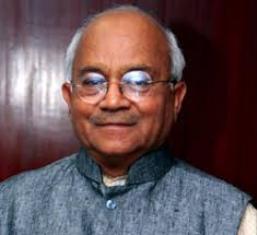Remembering those Dark days!
Published on June 25, 2022
Dr. Vedapratap Vaidik

Today, after 46 years, I vividly remember that black day of 26 June 1975. On the midnight of 25 June 1975, then President Fakhruddin Ali Ahmed blindly signed the declaration of emergency. Prime Minister Indira Gandhi’s brother-in-law had disconnected the power connections of many leading newspapers published from Delhi . Many newspapers that went for print earlier in the day could not carry the news regarding the proclamation of Emergency.
On that day I was in Indore. Early in the morning I went to visit my close friend and RSS pracharak KC. Sudarshan Ji. He was undergoing treatment for a bone fracture at a hospital in Jawahar Marg. By 8 in the morning when he switched on his transistor we got to know that Emergency had been declared across the country. I immediately rushed to the office of ‘Nai Duniya’, the most circulated Hindi newspaper of that time. I have been writing in it from a young age. In those days ‘Nai Duniya’ was popularly perceived as a Congress newspaper. Its owner Labhchandji Chhajlani and majority of the employees including Editor-in-chief Rahul Barpute, Editor Abhay Chhajlani were present in the office.
On my suggestion it was decided to leave the editorial space blank, because that was the best form of protest since any form of protest against the Emergency was banned. Same day afternoon, I boarded a train to Delhi. I was the co-editor of Navbharat Times (the largest circulated newspaper of the country) at that time. Our Editor Shri Akshay Kumar Jain called a meeting of all the journalists and strictly warned against opposing the emergency. After the meeting I told Akshayji that better I resign because I will not write a single word in favor of the government. He said, since I was an expert in foreign affairs. I need not write any editorial on national politics. Next day, Kuldeep Nayyar called a meeting of journalists of Delhi in the Press Club to protest against the Emergency. First he addressed the audience and then me. I urged all the journalists present there to sign the letter of protest against the Emergency. Within two to three minutes all disappeared.
In those days, the editorial and article to be published in the newspapers had to be first sent to a Malayali officer in Shastri Bhavan and with his clearance was a must for publishing the same.
In June 1976, the great book ‘Hindi Journalism: Various Dimensions’ edited by me was released at Rashtrapati Bhavan. Vice-President B.D. Jatti, many senior Union ministers and hundreds of journalists from across the country were present in that function. But I did not invite Prime Minister Indira Gandhi.
I told Akshayji in a firm tone that if she was invited I won’t be sharing the stage with her. In fact Indiraji knew me very well and I had great respect for her but during the Emergency my father, Jayprakashji, Chandrashekharji, Atalji, Morarji Bhai and many socialist and Jan Sangh friends were imprisoned.
During Emergency I had live contacts with senior leaders like Madhu Limaye, George Fernandes, Kamlesh Shukla and Swami Agnivesh. Many socialists, Jan Sanghis and former Congress leaders also used to hide in my house in Safdarjung Enclave. In all my public speeches I criticized Emergency, mincing no words. Once at a function in the Jabalpur University, in presence of the then Information Minister Vidya Charan Shukla I attacked Emergency. Many more touching anecdotes to share, but later!

*Dr. Vaidik is a widely travelled scholar-journalist. He has visited more than 80 countries on diplomatic and educational missions. Dr. Vaidik has won more than a dozen National and International awards for academic and journalistic excellence. He has been a member of several Advisory Committees of Government of India.



















